The Quest for Democracy: Queensland Parliamentary ABC 1899
By JOL Admin | 10 July 2015
Democracy has a star billing these days. Turn on the radio, pick up a newspaper, glance at the online commentariat and - whether it’s in the context of the Magna Carta’s 800 year anniversary, the Greek financial crisis, the independence of the Fourth Estate or protest about a proposed new development in suburban Brisbane - it’s surprising how many times you see the democratic principle invoked.
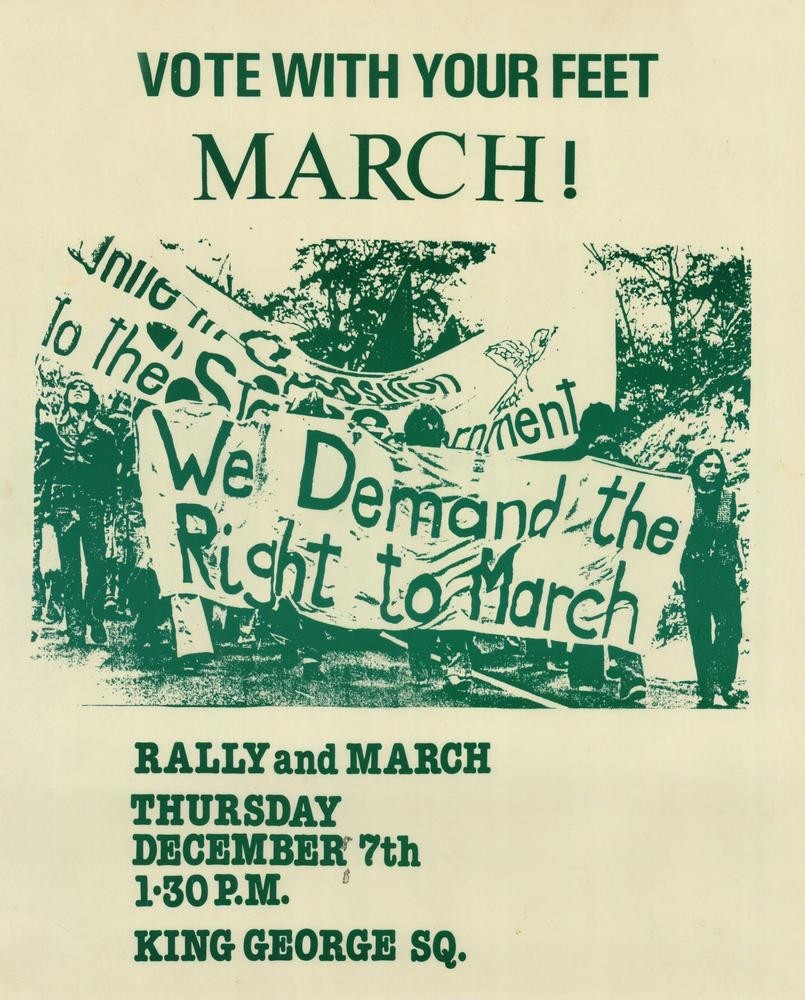
Vote With Your Feet March! Poster. John Oxley Library, SLQ
Aside from its currency and relevance to our everyday lives, there is a wonderfully rich history associated with the experience of democracy in Queensland. And as I’ve been discovering recently, it’s a history which is liberally reflected in both published and unpublished collections in the John Oxley Library. While democracy is a difficult thing to contain, its reach extending into almost every aspect of the state’s history and development, there are some definable events and movements in Queensland’s past which are inextricably linked to the relative health of our democracy.
In the context of the John Oxley Library’s collections some exceptional primary sources come to mind. The best known of these is the original Manifesto of the first Labour Party in the world, the Queensland Labor Party , a handwritten document addressed to the People of Queensland and signed by Thomas Glassey, widely recognised as the founder of the Labour movement and some years later, of the National Party in Queensland. In 2009 the Manifesto was added to UNESCO’s Memory of the World International Register, following its listing on UNESCO’s Australian register a year earlier. Its author was Charles Seymour, who along with William Lane and others, established the Queensland Worker in 1889. He subsequently served as The Worker’s editor between 1911 and 1915.
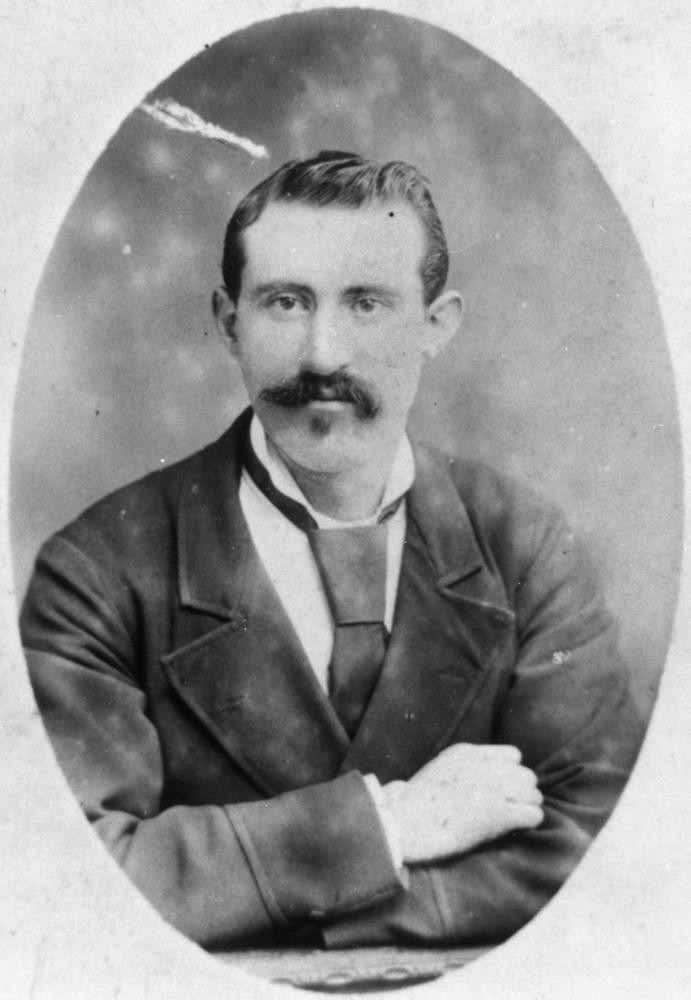
Charles Seymour. John Oxley Library, SLQ. Neg 160345
Charles Seymour’s papers (1880-1924) are held in the John Oxley Library and they include correspondence, press clippings, pamphlets, photographs and documents relevant to his involvement with The Worker and his activities within the Labor movement. Also held are Thomas Glassey’s papers (1903-1909 and the 1930s) which include, as well as photographs, speeches, publications, diaries and correspondence relating to his political career, a fascinating assortment of election literature in which Glassey is promoted as “one of the most practical exponents of democracy”. This collection is supplemented by Glassey’s clippings (1886-1903) and his 1903 Address To the Women Electors of Queensland.
Among other original material collections bearing closely on the theme of democracy are: the Stable Collection (1917-1991) which consists of records collected by J.J. Stable in his role as Senior Assistant Censor during World War I and perhaps the only surviving copy of Hansard #37 whose publication was famously suppressed by Prime Minister Billy Hughes on the night of 22nd November 1917; the Rawson Family Archive which includes a unique record of the North Queensland Separation Movement in the form of the Movement’s Letter Book; the newspaper features, courtroom sketches and cartoons belonging to the Tony Fitzgerald Collection (1984-2009) which vividly evoke the Fitzgerald Inquiry; and the Queensland Women’s Adult Suffrage Address, illuminated on parchment and presented to Queensland Premier, Sir Arthur Morgan in July 1905.
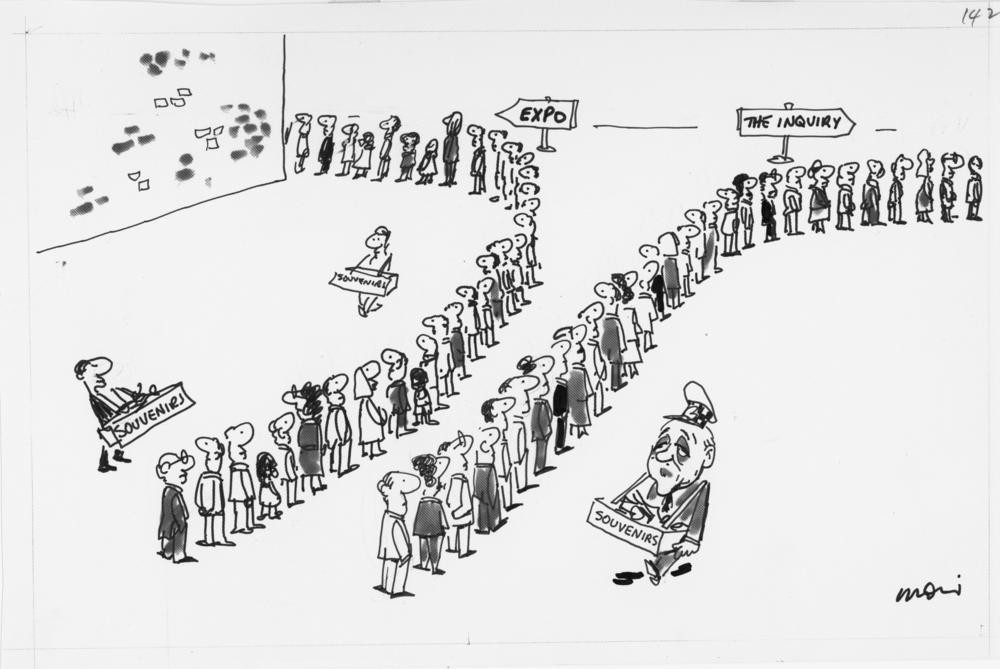
Queues for Expo 88 and the Fitzgerald Inquiry. John Oxley Library, SLQ. Neg 193629
Democratic principles are certainly associated with any number of events in the course of Queensland’s political and industrial history. A few of the more obvious instances are linked to our parliamentary and electoral history, the infamous Gerrymander, the colourful chronicle of strike action around the state, the referendums we’ve voted in, separation movements based in north and central Queensland, our civil rights and political protest movements, the demise of our Legislative Council, the debate about a Bill of Rights, the high level corruption exposed during the Fitzgerald Inquiry.
There are scores and scores of intriguing collection items in the John Oxley Library which bear witness to these and other aspects of Queensland’s democratic history – original and digitised photographs, the complete Queensland branch records of the Australian Labor Party, larger than life posters produced for protest rallies, election ephemera and political leaflets dating back to 1870, Royal Commission reports, student newsletters, strike bulletins and original pamphlets from the Great Shearer’s Strike of 1891 onwards, early electoral rolls, 19th century tracts on the subject of democratic reform, iconic Queensland cartoons from the Joh era.
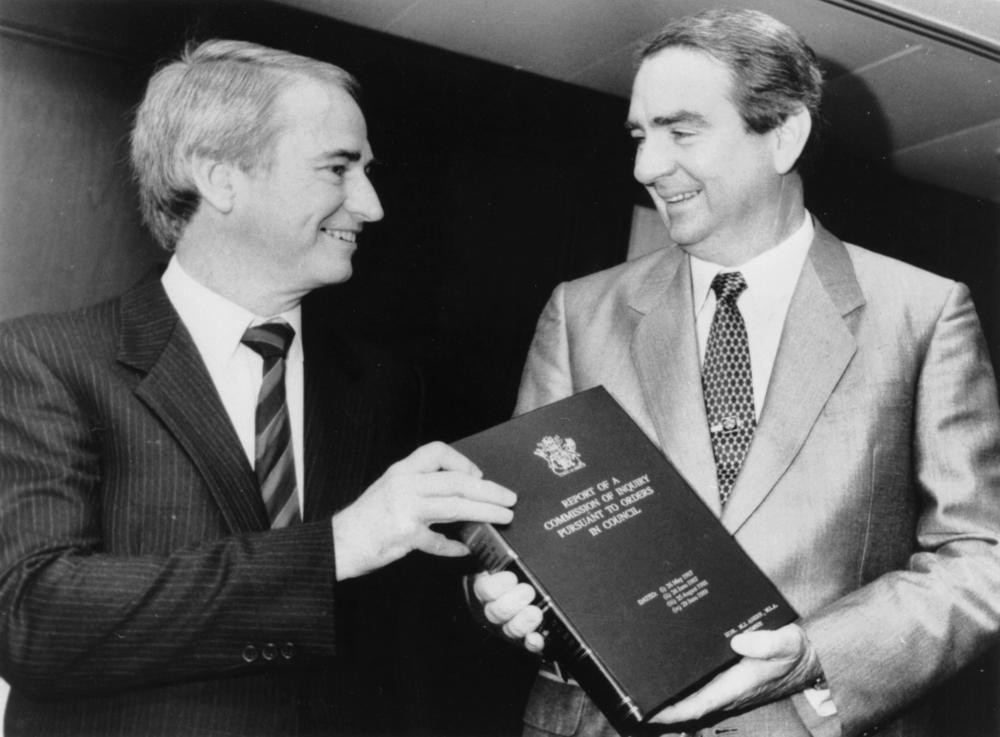
Tony Fitzgerald handing a copy of the Fitzgerald Report to Premier Mike Ahern 1989. John Oxley Library, SLQ. Neg 78930.
One obscure item amongst the substantial collection of interesting resources relating to the larger theme of democracy is singled out here, not for its value as an objective historical record, but because of what it reveals about the era in which it was published - and, it must be admitted, because of its inimitable quaintness. It is a slender, aging publication faintly reminiscent of an old fashioned child’s colouring book - florid lettering, a line drawing of Parliament House, a blank With compliments space to accommodate its intended passage as a gift and the unassuming title Queensland Parliamentary ABC 1899.
For a number of reasons bearing upon the state of democracy in Queensland, 1899 was a significant year. It came at the end of a decade dubbed the “continuous ministry” which produced six colonial premiers from a political grouping known as the “Ministerialists” who managed to maintain almost continuous control of Parliament over an extended period. Politically conservative, the Ministerialists generally supported the development of the colony’s pastoral and mining industries. For the majority of them their parliamentary involvement took second place to their business interests, a circumstance which goes some way to explaining an excoriating opinion piece in The Week, the gist of which was an argument that many members were primarily there for the £25 cheque they received as a monthly entitlement. Questioning the wisdom of a fixed allowance, the editorial argues, in the interests of improving “the chances of useful legislation” and “the elevation of our Parliament”, for a return to a per sitting allowance:
“Some of these men, when they succeed in their endeavour to get into Parliament … not being blessed with the power of fit mental digestion, manage to emit more nonsense to the hour than any well informed man could utter in a month.”
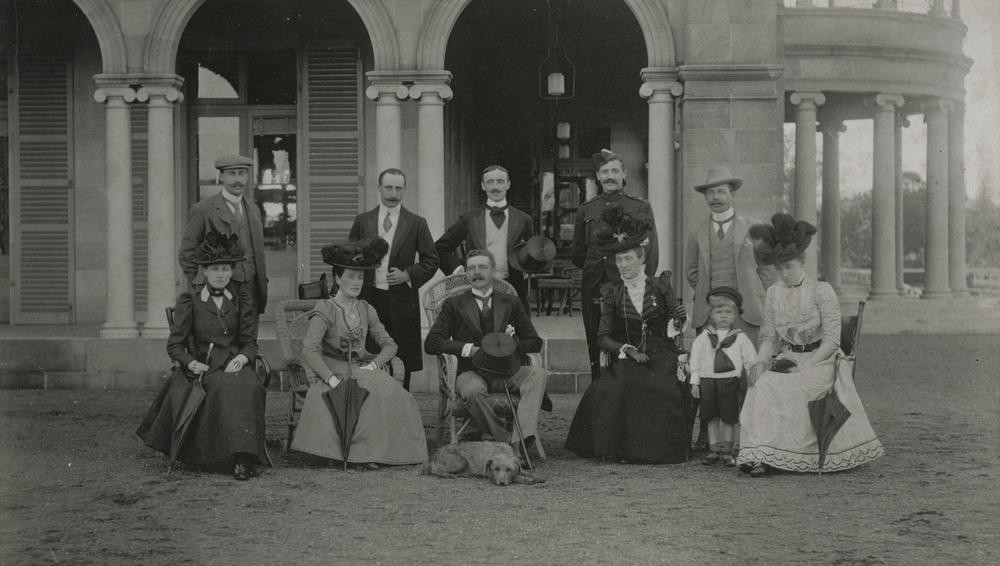
Lord Lamington and the official party at the opening of Parliament Brisbane 1899. John Oxley Library, SLQ. Image no. APO 035 0001 00.
The Queensland Parliamentary ABC is based on the 13th Legislative Assembly when the ruling Ministerialist Party was led by Premier, Chief Secretary and member for Bulimba James Robert Dickson. Dickson took office in September 1898 following the death of former premier Thomas Byrnes and he retained the premiership for exactly one year and 61 days. The 72 members of the Legislative Assembly which is the focus of this publication were elected (or re-elected) in a state ballot held over a 25 day period in March 1899. The Ministerialists won 40 seats, Labour 22, the “Opposition” 7 and the Independents 3.
The platform of the Dickson Government was set out in a Premier’s Manifesto which emphasised the case for joining the federation, the pursuit of a vigorous program to develop rail, harbours and public works, the revival of a measured immigration program, the exclusion of “coloured and alien” labour, support for the pastoral industry and for experimental agriculture, an increase in the supply of land, protection of native timbers, a commitment to attracting foreign investment in mining ventures and the empowerment of local government.
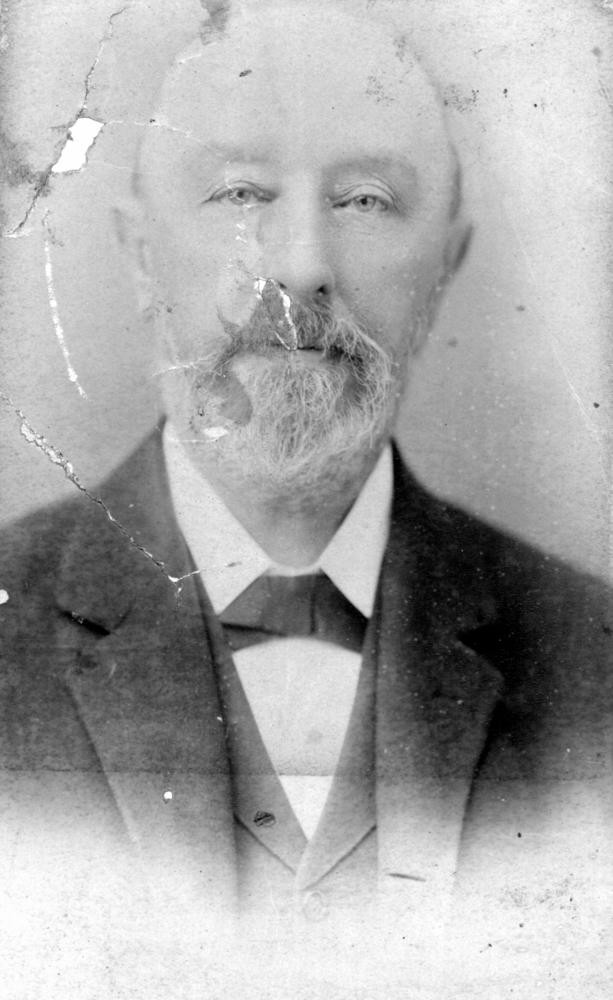
Honourable James Robert Dickson. John Oxley Library, SLQ. Neg 194642
How well democracy was served during this period is contestable. One theory holds that Dickson was a stopgap leader and was in fact, only nominated when Sir Robert Philp withheld his candidature on the basis that Dickson could more effectively prosecute the case for joining the federation. (As the colony’s representative in the Federal councils in 1886 and 1888 Dickson had opposed Queensland’s participation in the Convention movement.)
As late as February 1899 Dickson’s attitude to the Convention Bill, according to The Week was “evasive”, the editor’s opinion being that: “Mr Dickson has none of the force of character which was shown by Sir Samuel Griffith and Sir Thomas Mcllwraith who were pronounced federationists.” “If there is no lively interest in the question” he continues “it may be because there is no one at the head of affairs who is inclined to lead.”
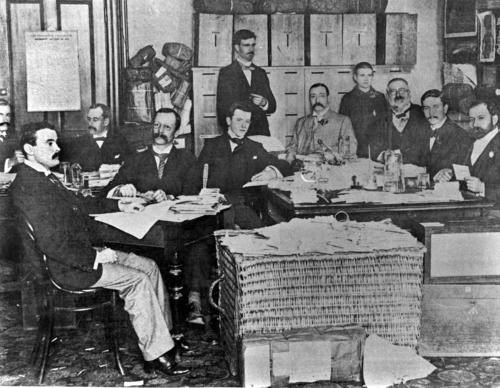
Election staff at the Referendum Brisbane 1899. John Oxley Library, SLQ. Neg 12070.
Despite his apparent vacillation on the question at this point, Dickson was later recognised for his effective support for the federation in Queensland and was held to be largely responsible for having secured the “yes” vote in the Referendum. In the circumstances this was no small achievement given that only about fifty percent of the Legislative Assembly supported the cause and both the Legislative Council and the business community in metropolitan Brisbane were strongly opposed to it. He was subsequently appointed to the first federal ministry under Edmund Barton on 1st January 1901 and would have stood for election to Australia’s first Federal Parliament had he not died ten days later.
Also prosecuting the case for Federation was Thomas Glassey who led the inaugural Labour opposition between August 30th 1898 and May 12th 1899. Significantly for democracy, Glassey is generally credited with having led the first Labor opposition anywhere in the English speaking world. At the end of 1898 Glassey was appointed as a Queensland representative on the Federal Council of Australasia and is particularly recognised, in the final month of the campaign (when he toured Queensland extensively), for having influenced the Labor vote in the face of a strongly anti Federation Labour press.
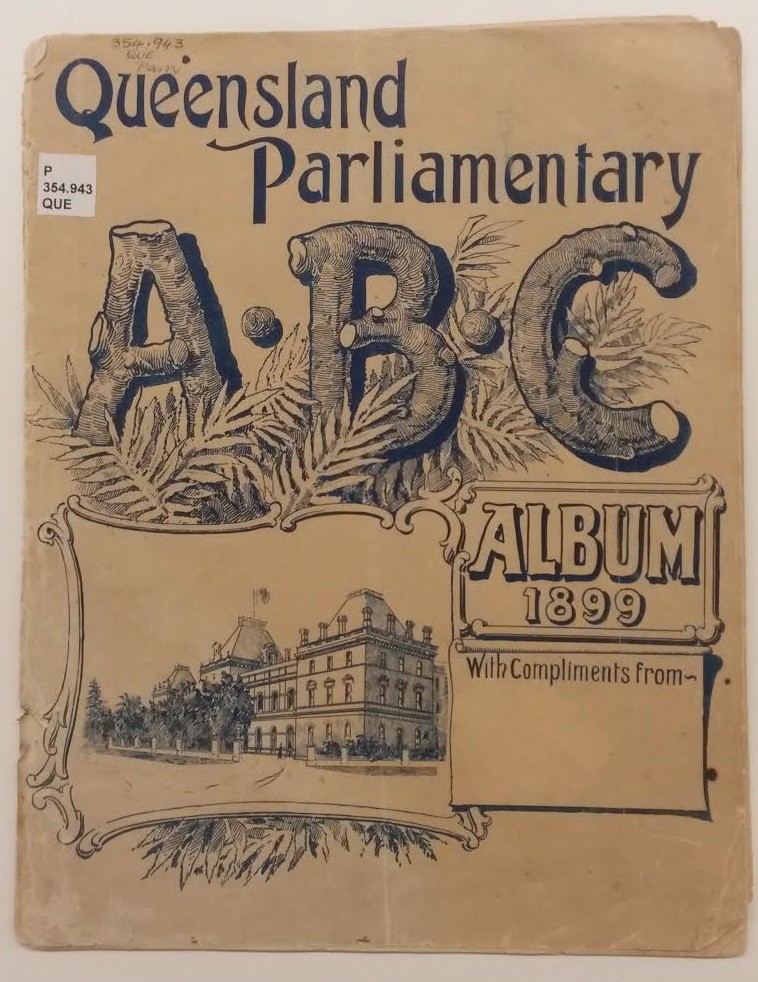
Queensland Parliamentary ABC 1899. John Oxley Library, SLQ
Dickson and Glassey both get a mention in the Queensland Parliamentary ABC. They share with 22 other MPs the dubious honour of being featured in a rhyming character analysis which purports to pin down a critical aspect of their personality or political achievement. While the “poet” remains obscure (it could have been Walter Adey the publisher) there is an undisguised bias towards the ruling Ministerialist Party. Glassey, as an “ex leader” by the time this publication appears, escapes some of the more robust characterisation reserved for his contemporaries:
GLASSEY, of “Labour” the ex-leader, / A wordy inveterate pleader / For liberal laws in a liberal cause, / Of Socialist doctrines a breeder.
No such quarter is given to his successor, former gold miner, Anderson Dawson:DAWSON has often been chaffed / About sinking a forty foot shaft; / But this knight on the pick gave it up pretty quick, / And took to political graft.
D stands for the man of the hour, / Of strength to his party, a tower. / Come join the refrain, may DICKSON long reign / And long be his party in power.
PHILP, whose work is his pleasure, / Whose duties allow him no leisure; / With him lies the fate of the cash, / A Treasurer born and a treasure.
The Ministerialist portraits are in stark contrast to that of George Curtis, independent member for Rockhampton and passionate advocate for the Central Queensland Territorial Separation League:
CURTIS, a serious grafter, / Was never found guilty of laughter. / Separation’s his theme, the Northerner’s dream, / And let Federation come after.
The Queensland Parliamentary ABC 1899 came to light in connection with a present day focus, here in the John Oxley Library, on the subject of democracy. On the evening of July 21st, 116 years after this booklet went to print, democracy in the state of Queensland will be the subject of an engaging Night in the JOL discussion involving political journalist turned academic, Lorann Downer and prize-winning author and journalist Matt Condon in conversation with ABC Radio National’s Ian Townsend.
To secure your seat at this much anticipated event visit State Library’s What’s On web page and make a booking. In the best interests of democracy all tickets are free.
Libby Fielding - John Oxley Library, State Library of Queensland
Comments
Your email address will not be published.
We welcome relevant, respectful comments.